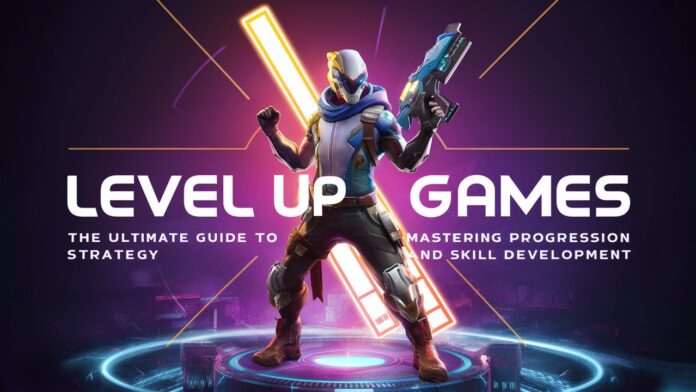Introduction
The concept of “leveling up” has become a cornerstone of modern gaming, representing growth, achievement, and mastery. Level Up Games, whether referring to specific titles, gaming studios, or the broader mechanics of progression systems, captivate players by blending challenge and reward. This article dives deep into the mechanics, psychology, and strategies behind level-up games, exploring how they engage players, foster skill development, and create immersive experiences. From RPGs to competitive esports, we’ll dissect what makes these games addictive, educational, and endlessly entertaining.
1. The Psychology Behind Leveling Up in Games
Leveling up taps into fundamental human desires for achievement and self-improvement. Games that incorporate progression systems trigger dopamine release, rewarding players with visual, auditory, or narrative feedback for their efforts. This “carrot-on-a-stick” approach keeps players invested, as each level represents a milestone that validates their time and skill. For example, games like World of Warcraft or Elden Ring use incremental challenges to build a sense of accomplishment, while mobile games like Candy Crush employ bite-sized level designs to encourage short, frequent play sessions. Understanding this psychology helps developers create compelling loops and empowers players to optimize their gaming habits.
2. Key Elements of Successful Level Up Games
The best level-up games balance progression systems, skill-based challenges, and meaningful rewards. Progression systems often include experience points (XP), skill trees, or unlockable content that scales with player effort. Skill-based challenges ensure that leveling up isn’t just about grinding but requires strategic thinking, reflexes, or teamwork. For instance, League of Legends rewards players with ranked tiers for mastering mechanics and game knowledge. Meanwhile, rewards—such as cosmetic items, story advancements, or new abilities—must feel valuable to maintain engagement. Games like The Witcher 3 excel here, weaving narrative progression with character development to keep players emotionally invested.
3. Level Up Mechanics: From RPGs to Competitive Esports
Level-up mechanics vary across genres. In RPGs (e.g., Final Fantasy or Skyrim), progression is tied to character stats, quest completion, and exploration. Players invest hours into building their avatars, creating a personalized journey. Conversely, competitive esports like Valorant or Apex Legends use ranking systems where leveling up reflects mastery over gameplay mechanics and teamwork. Even casual games like Stardew Valley incorporate progression through farm development and relationship-building. Each genre adapts leveling systems to its core gameplay, proving that progression is a universal motivator.
4. Strategies to Level Up Faster and Smarter
To maximize efficiency, players should focus on goal prioritization, resource management, and adaptive learning. Prioritizing main quests or high-XP activities accelerates progression, while managing in-game resources (e.g., currency, health kits) prevents setbacks. Adaptive learning involves studying game mechanics, watching tutorials, or analyzing mistakes—critical in games like Dark Souls, where trial and error is key. Joining communities or guilds can also provide mentorship, as seen in MMORPGs like Final Fantasy XIV. Remember, leveling up isn’t just about speed; it’s about sustainable growth.
5. The Role of Challenges and Difficulty Scaling
Well-designed level-up games implement dynamic difficulty scaling to match player skill. Games like Hades adjust challenges based on performance, ensuring neither boredom nor frustration. Optional “elite” levels or New Game+ modes (e.g., Horizon Zero Dawn) cater to hardcore players seeking tougher rewards. Challenges must feel fair; artificial difficulty spikes can alienate audiences. Instead, gradual scaling, as seen in Celeste’s assist mode, allows players to tailor their experience, promoting inclusivity without compromising achievement.
6. Level Up Games and Their Impact on Real-Life Skills
Beyond entertainment, level-up games teach problem-solving, patience, and resilience. Strategy games like Civilization VI enhance critical thinking, while multiplayer titles foster communication and teamwork. Studies show that gamers often exhibit improved hand-eye coordination and decision-making speed. Even failure in games—like losing a ranked match—builds grit, encouraging players to analyze mistakes and adapt. This crossover between virtual and real-world skills underscores the educational potential of well-crafted progression systems.
Conclusion
Level Up Games represent more than a trend; they’re a framework for engagement, learning, and personal growth. Whether you’re a casual player seeking fun or a competitive gamer chasing mastery, understanding progression mechanics, strategies, and psychology can transform your experience. By embracing challenges, optimizing playstyles, and appreciating the artistry behind these systems, players and developers alike can unlock the full potential of gaming as a medium for achievement and connection.
Frequently Asked Questions (FAQs)
Q1: What defines a “level-up game”?
A level-up game centers on progression systems where players advance through stages, unlock rewards, or improve skills. These include RPGs, esports, and even puzzle games with tiered challenges.
Q2: How can I level up faster in competitive games?
Focus on mastering core mechanics, review gameplay replays to identify weaknesses, and collaborate with teammates. Consistent practice and targeted learning yield better results than mindless grinding.
Q3: Are level-up games suitable for all ages?
Yes! Many games offer adjustable difficulty and family-friendly content. Titles like Animal Crossing or Pokémon cater to younger audiences while still providing progression.
Q4: Do level-up systems encourage unhealthy gaming habits?
While addictive by design, moderation is key. Set time limits, prioritize real-life responsibilities, and choose games that respect your time (e.g., those with offline modes or save features).
Q5: Can level-up mechanics improve real-world skills?
Absolutely. Games teach strategic planning, resource management, and perseverance—skills applicable to academics, careers, and personal goals.
This comprehensive guide equips you to navigate the world of Level Up Games with confidence, whether you’re playing for fun or striving for greatness. Happy leveling! 🎮✨

